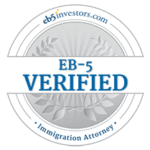Robert Lee is an EB-5 attorney and the chairman of Worldwide Crossing Law Group P.C. Since 2010, he has focused his practice exclusively on business immigration matters, and particularly with EB-5 Direct, EB-5 Regional Centers, L-1, and E-2 petitions. In the EB-5 sector, Attorney Lee has experience representing immigrant investors, companies and regional centers. He has assisted EB-5 investor clients to obtain approvals on their immigration petitions, preparing and filing I-526 and I-829 petitions. He has also worked with regional center clients on their I-924 applications, and has successfully submitted petitions for a number of leading regional centers in the country.
Worldwide Crossing Law Group provides legal services in the fields of corporate, business, real estate, intellectual property, and immigration law, with the last being a key focus of the firm. With the new Presidential Administration, Worldwide Crossing Law group offers all immigration assistance, including aggressive services in the area of asylum, removals, and deportations. The firm’s stated mission is to be a reliable a trustworthy source of legal counsel so clients can make wise decisions and achieve their personal and business goals in the United States.
Attorney Lee earned his Juris Doctor from the Southwestern University School of Law. Prior to that, he received his bachelor’s degree in business economics from the University of California, Santa Barbara, and applies this business knowledge when handling EB-5 petitions. Currently, he is providing of counsel assistance to the Law Offices of Jane Oak. Before creating Worldwide Crossing Law Group P.C., Attorney Lee worked at the Law Office of Stephanie Chang, and then at Stone Grzegorek & Gonzalez LLP. He is in good standing and an active member of the California State Bar and speaks both Korean and English.
Answers to EB-5 93 Questions Answered
- How much of a company must I own to be eligible for an EB-5 visa?
- What criteria should be considered to select an EB-5 attorney?
- When must EB-5 regional center fees be paid?
- What sector can an EB-5 investment be in?
- Who can get a green card with the main EB-5 investor?
- How does USCIS view binary options as an EB-5 investment source?
- Who can transfer the funds to the EB-5 regional center?
- What does it mean if an EB-5 project already has I-526 approvals?
- When should I have my direct EB-5 business plan?
- How does USCIS regard employee turnover in an EB-5 business?
- What forms need to be filed in the EB-5 application process?
- How can an L-1 visa holder apply for EB-5 and remain in the United States?
- How can we advance an EB-5 case affected by the 1998 AAO decisions?
- When must an EB-5 pooled investment be completed?
- How many EB-5 investors can a startup business have?
- How can a married couple apply for the EB-5 program?
- What is an EB-5 investment in a “rural” area?
- How do we decide between E-2 or EB-5 based on assets?
- What are the net worth requirements for EB-5 visa applicants?
- When must the EB-5 TEA requirement be met?
- What is a U.S. citizen responsible for in an EB-5 direct partnership?
- What funds are eligible as a source of EB-5 investment?
- When should a potential EB-5 investor choose an immigration attorney?
- How can I make an EB-5 investment using my company account?
- How can a same-sex partner also get an EB-5 visa?
- How can I open a franchise and qualify for the EB-5 program?
- How is Form I-824 used to protect an EB-5 beneficiary from retrogression?
- What percentage of the new business must the EB-5 applicant own?
- Who can apply for the EB-5 program?
- How restrictive is the EB-5 visa medical screening?
- When does the total EB-5 investment need to be made?
- What is the purpose of the new I-829 petition?
- What does it mean if a regional center has had a project-based RFE?
- How can a married couple make an EB-5 investment using a loan?
- What if an EB-5 applicant is unable to provide tax returns?
- How quickly must 10 jobs be created in an EB-5 direct business?
- How are rural areas defined for EB-5 investment purposes?
- How does EB-5 financing work with conventional capital?
- What information do attorneys require from EB-5 applicants?
- How can a real estate developer also be an individual EB-5 investor?
- What constitutes an asset for EB-5 investment purposes?
- What happens if an EB-5 applicant begins work at a different business?
- How can we tell if our business qualifies for an EB-5 sale?
- When is the age of a child relevant in the EB-5 process?
- What costs count toward EB-5 when franchising a foreign brand?
- How will TEA changes affect in-progress EB-5 projects and applications?
- When can an EB-5 project include both regional center and direct investments?
- Why are escrow accounts used when investing through EB-5 regional centers?
- What securities laws apply to EB-5 investors recruiting other applicants?
- What documents are needed to start the EB-5 application process?
- How can the owner of an outsourced U.S. business apply for EB-5?
- How will the new rules about EB-5 loans affect a pending I-485?
- Who is responsible for reviewing each stage of the EB-5 application?
- How can an investor use financing and qualify for direct EB-5?
- What occupations cannot be counted towards EB-5 job creation?
- What are the EB-5 source of funds requirements for domestic capital?
- How can income earned on previous visas be used for EB-5 investment?
- How can a non-accredited EB-5 investor invest through a regional center?
- What are Regulation S and Regulation D?
- When can a regional center facilitate contact between EB-5 investors?
- How long does it generally take for a business to qualify for EB-5 funding?
- How involved can a charity be in an EB-5 direct investment?
- How can two investors from the same family apply for EB-5 direct?
- How do I verify the background of an EB-5 migration agent?
- How can a novice investor ensure the success of their EB-5 investment?
- What type of business structure is eligible for EB-5 direct investment?
- What happens if my I-94 expires while my I-485 is still pending?
- How can an EB-5 petitioner use his business as an investment source?
- What qualifies as an EB-5 troubled business?
- What is a NOID and how does it differ from an RFE on an EB-5 application?
- How much does it cost to immigrate through EB-5?
- How can my children finish school after applying for EB-5?
- What benefits will my family have as EB-5 conditional permanent residents?
- How can an EB-5 investment be made with 401k retirement funds?
- When can relocated employees be counted towards the EB-5 requirement?
- How can an EB-5 investment be insured considering the at risk rule?
- How will a change of EB-5 business location be viewed by USCIS?
- How will retirement affect EB-5 visa eligibility?
- What are the EB-5 investment requirements for startups?
- What happens if an EB-5 investor divorces after I-526 approval?
- How can I apply for EB-5 if I am out of status in another country?
- How can an unsecured loan be used for EB-5 investment?
- What is the minimum age requirement for EB-5 investors?
- How can an EB-5 immigrant work in the United States?
- How do EB-5 requirements vary for different countries?
- What should a securities attorney know about the EB-5 program?
- Who is allowed to gift funds for an EB-5 investment?
- When do EB-5 investment funds first have to be “at risk”?
- How do I get the I-829 receipt notice for my EB-5 application?
- How can an EB-5 investor determine regional center quality?
- How can an investor reapply for EB-5 after a failed investment?
- How will an EB-5 application affect an OPT-extension application?
- What should I know about EB-5 before deciding to invest?
Verified EB-5 Investors
As of February 27, 2015
- EB5Investors.com found no public criminal record on BeenVerified.com
- Active BAR member in good standing
What does it mean to be a VERIFIED member of EB5Investors.com?
EB5Investors.com verifies attorney members before placing them on our directory. Not all professionals pass the verification process, and we are not paid by members in any way for verified badges. The entire verification process is performed by EB5Investors.com staff members based in Irvine, California.
We perform a background check on the member by using BeenVerified.com’s online background check tool. The BeenVerified.com criminal background database is compiled by pulling together public records. Misconduct, such as a proven criminal record, disqualifies the applicant from obtaining a verified badge from EB5Investors.com. For attorneys that practice law in the United States, a staff member also checks to make sure the attorney is in good standing with the BAR of the state they represent to practice bar in.
The Verified Badge does not mean or represent that the attorney has experience or specializes in immigration law. Please consult the State Bar or other government based sites for more information on a particular attorney.





